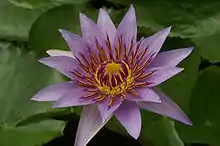Nymphaea colorata
Nymphaea colorata is a water lily that is native to tropical East Africa. It was first described by A. Peter in 1928.
| Nymphaea colorata | |
|---|---|
 | |
| Scientific classification | |
| Kingdom: | Plantae |
| Clade: | Tracheophytes |
| Clade: | Angiosperms |
| Order: | Nymphaeales |
| Family: | Nymphaeaceae |
| Genus: | Nymphaea |
| Species: | N. colorata |
| Binomial name | |
| Nymphaea colorata Peter, 1928 | |
Description
Nymphaea colorata is day blooming and nonviviparous plant. Its flower has dark blue to violet color and consists of 4-5 sepals and 13-15 petals. The shape is cup-like with a diameter of 11–14 cm. The round leaves are green on the top and have bluish-violet underside. Their size is about 20–23 cm and their spread is 0.9 to 1.8m
Usage
Nymphaea colorata is used as an ornamental flower and has the advantage of having a long flowering period. In addition it even keeps flowering when the temperatures drops to 18 C. It has been used to create several cultivars and hybrids.
References
- Perry D. Slocum: Waterlilies and Lotuses. Timber Press 2005, ISBN 0-88192-684-1 (restricted online version at Google Books)
- Fact sheet for the Nymphaea colorata
| Wikimedia Commons has media related to Nymphaea colorata. |
This article is issued from Wikipedia. The text is licensed under Creative Commons - Attribution - Sharealike. Additional terms may apply for the media files.